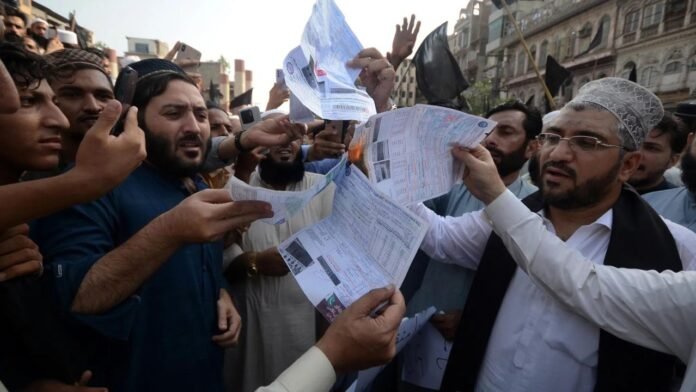Life has been made difficult for the public of Karachi by their electricity bills due to frequent increases in electricity prices that make them exceed their incomes. The government’s reassurances have not been accepted by the citizens, demanding a decrease in electricity prices. Increases in the basic tariff continuously raise the average basic electricity tariff to Rs. 35.5 per unit while surcharges double. These increased costs have a far-reaching impact on the entire city, affecting households, businesses, and agriculture.
On average, consumers pay at least Rupees 10,000 to 20,000 as billings. This includes GST on fuel price adjustment and PTV fee amounting to Rs. 35; therefore, they pay these additional charges: finance surcharge of Rs. 3.41, quarterly adjustments fee of Rs. 3.32, and this month’s fuel price adjustment fee of Rs. 3.32 plus GST on fuel price adjustment among other things for each customer respectively apart from paying basic tariff which comes with an additional tax rate of about eight percent (8%). Such extra charges have greatly aggravated the financial burden upon consumers, leading to widespread discontentment and annoyance from different people around Karachi city, calling all such acts simply robbery activities on their wallets, questioning even justice behind double charging them with GST.
The public wants a cheaper power supply. They also need help distinguishing between protected and non-protected consumers regarding expensive electric power supplies. If the consumer’s consumption exceeds two hundred units by just one unit, they become unprotected, and their payment will more than double. The payment must be made over six consecutive months. The base tariffs for protected customers are Rs. fourteen per unit, but if someone uses just one extra unit. The company will bill them Rs. twenty-three point five nine per unit. This vast difference in expenses because merely crossing the threshold limit by one unit causes much distress among buyers who feel penalized for minor usage increments.
High energy costs concern people with low incomes and middle-income earners; with a basic tariff of Rs 39.15 per unit, consumers using between 401 and 500 units fall into this category. The potential bill that a 400-unit consumer would incur is Rs. 22,838, while that for a consumer of 500 units is Rs. 30,202. The exorbitant cost of power affects individuals and businesses, especially regarding operating costs and profitability.
Farmers are becoming concerned about the introductory rate paid to agricultural consumers—it is currently Rs. 44.05 per unit. Electricity is essential for irrigation and other purposes in agriculture, one of the most critical sectors of every national economy. The rise in energy prices has compounded existing challenges farmers face. Including inflation of input costs and fluctuating market values for the goods they produce. Increased electricity rates alone have resulted in an increased total cost burden on customers amounting to rupees thirty-two seventy-four billion, thus underscoring pressures exerted on the population.
The continuous escalation in electricity prices and the imposition of various surcharges reflect broader economic challenges and inefficiencies within the power sector. The government must provide affordable and reliable electricity. Citizens want immediate reformations to reduce electricity expenses. Increase efficiency at power generating stations and distribution systems, and make transparency part of billing approaches.
The skyrocketing electricity bills in Karachi have severely impacted the living conditions of its inhabitants. The call for cheaper power and more equitable billing by the masses reflects. The compelling imperative of government intervention and reform in energy. We must tackle these concerns to sustain the economic prosperity of households and firms; otherwise…
They will only worsen the financial difficulties prevailing among Karachi’s populace.


